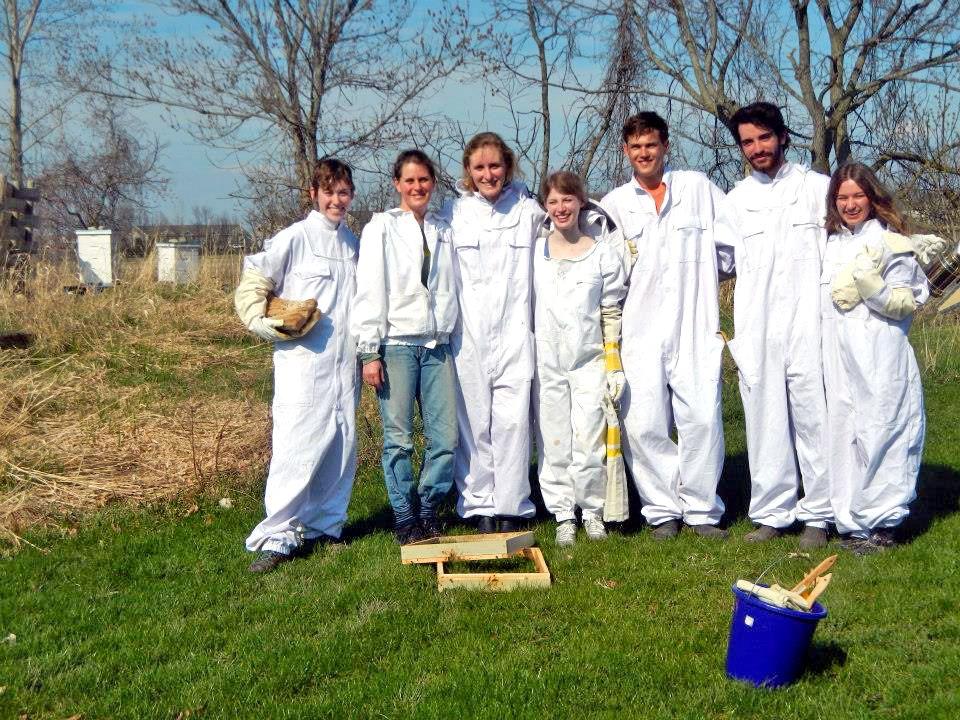Saving the bees

GVL / Courtesy GVSU Beekeepers Club
Nov 12, 2015
Honeybees help to pollinate over one-third of the food that is produced in the U.S., but recently they have been facing many problems. That’s why the GVSU Beekeepers want to raise awareness and educate people about bees.
Since 2011, GVSU has been the home of two apiaries, or beehives. Two hives live on the Holland Campus and two live in Allendale at the Sustainable Agriculture Project, just off campus.
Liberal studies professor Anne Marie Fauvel was the driving force behind the initiative to bring the bees to campus. She noticed that there were a lot of people concerned about food systems and sustainability, but no one was addressing the importance of bees to the environment.
“We all know that the pillar of our food system is really on the back of the honeybees,” Fauvel said. “Here on campus, there were a lot of people doing food work, but not a lot doing bee work.”
Fauvel teamed up with one of her students in the fall of 2011 to write a grant seeking the startup funding for hive construction through the GVSU Sustainable Community Development Initiative.
Once the bees were established on campus, Fauvel began GVSU Beekeepers as a way to connect students with the bees, bringing awareness to the topics surrounding beekeeping.
“People are concerned about bees, but they don’t necessarily understand everything that revolves around the bees,” Fauvel said. “(At GVSU) we have quite a few students interested in sustainable food systems as well as the role of bees in that particular system.”
GVSU Beekeepers helps to maintain the hives and educate the campus community about honeybees through events like lip balm making. The beekeeping club will also host a discussion with Christine Jacobson, an apitherapist. Apitherapists are people that study bees and the uses of bee byproducts like honey and wax.
“It’s necessary to bring up a dialogue about bees and the challenges they are facing,” said Kali Smolen, president of GVSU Beekeepers.
The club usually hosts discussion events in the late fall and during the winter, since they tend to be busy with the hives during the warmer seasons. In the spring, the club usually spends their time building, cleaning and preparing the hives, while during the summer it’s all about maintaining the hives and making sure honey production is going well.
By late summer it’s time for extraction, so the club has a honey extraction event where they take the honey and the wax from the bees, extracting it using a centrifuge. Once they get the impurities out, they bottle the honey to sell it in the liberal studies office in Lake Ontario Hall.
During their downtime, GVSU Beekeepers and the beekeeping initiative on campus is trying their hardest to raise awareness about the issues bees are facing by conducting research. Right now, there are two research projects that have studied the bees: the BeeCloud Project and the HoneyBeeNet Project.
The BeeCloud Project was a capstone project for a group of engineering and computer science students. They built a physical beehive hardware scale complete with SMS capability and data uploading abilities to monitor real-time beehive data through a cloud system.
The HoneyBeeNet Project is part of a larger initiative done by NASA. Data from GVSU’s hive is collected and uploaded to a cloud system and is then used for different things, like tracking climate change and the impacts of land use.
“Aside from pollinating our crops and putting food on the table, there’s also all these other really cool things that relate to (bees),” Fauvel said.
Smolen said that the beekeeping club is about to begin another bee research project that will look at the two campus environments to compare the bee forage and bee health differences between the hives.
“Bees are much more than stinging insects, they’re actually a really important aspect to society,” she said. “Without them, we’d be devoid of a lot of healthy food options in our food system.”
Fauvel said that though the reactions to bees can be mixed, they’ve had a lot of success with opening people’s eyes to the importance of bees.
“There’s so much more than meets the eye with honeybees,” Fauvel said. “(They) go beyond producing honey, there’s all these other fascinating facets of them.”
To showcase the different facets of honeybees, GVSU Beekeepers will host a lip balm making workshop on Nov. 15 in the VanSteeland Living Center Multipurpose Room. On Nov. 20, the club will host an educational discussion with Christine Jacobson in the Kindschi Hall of Science.

























